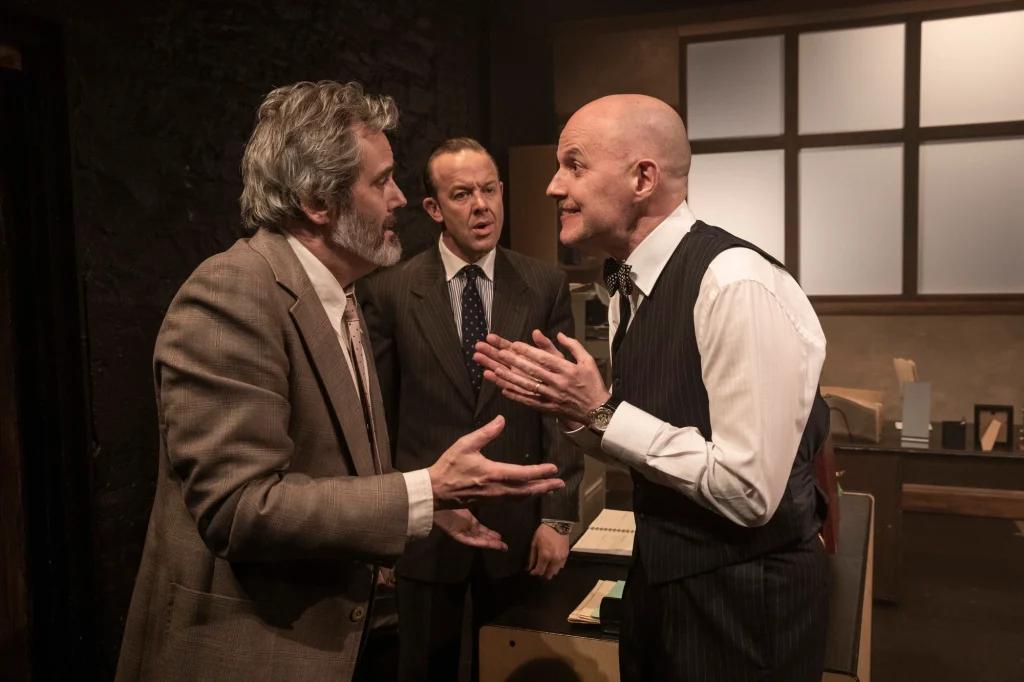
“Always Tell The Truth, George; It’s The Easiest Thing To Remember”
Practical information
If you are interested in auditioning for any of the roles listed below, please email creative@marinetheatre.com and say which times you are available, your level of experience, and the role you would like to audition for.
The sections to be read at the auditions can be downloaded here.
Auditions will take place Sunday 8 January 11 A.M. – 3:30 P.M. and Monday 9 January – Wednesday 11 January 5 – 9 P.M.
More dates may be added but please get in touch as soon as possible, we will do our best to accommodate you if you are unable to attend any of the available slots.
Actors do not have to be professional but this are fantastic roles to suit those with some experience.
“Put that coffee down! Coffee is for closers only!”
Rehearsal schedule
The cast will rehearse regularly at 6:30 P.M. – 9 P.M. on Tuesdays and 10:30 A.M. – 1:30 P.M. on Sundays at the Marine Theatre. The production will be staged for three nights 25 – 27 May.
Full tech and dress rehearsals will be confirmed in due course.

“ABC. A – Always. B- Be. C – Closing. Always Be Closing.”
ROLES
Shelly Levene (The Machine)
A washed-up real estate salesperson, Late 40s to late 50s. Shelly “The Machine” Levene was successful years ago, but recently has hit a streak of “bad luck” and is in danger of getting fired. Levene desperately wants to save his/her career, and this desperation is usually grotesquely apparent.
Ricky Roma (Roma)
A big-shot real estate salesperson, late 20s to early 40s. Roma is the top name on the board at the office, which means Roma is currently the most successful salesperson. It is easy to see why he/she does better than the others: Roma is smart, charming, and incredibly quick-witted. Rather than trying to force customers to submit to the usual sales tactics, as the others do, Roma lures people into thinking they want what Roma is selling.
John Williamson (Williamson)
The manager of the real estate office, 20s to late 30s. Williamson’s job is to oversee the operations of the office and to assign the sales team their leads. The team dislike Williamson because of his/her status as the “company man” merely following orders from Mitch and Murray, the owners of the real estate business. The rest of the office do not think he /she really understands the business.
Dave Moss (Moss)
An angry real estate salesperson, 20s to late 40s. Moss harbors a great deal of resentment toward the company. He/she is not a subtle person and tends to lash out angrily when under pressure. His / her sheer aggression makes Moss a more successful salesman than Aaronow or Levene, but he / she has none of Roma’s verbal agility.
George Aaronow
A timid real estate salesman / woman 40s to late 50s. Aaronow is extremely meek and mild- mannered. In conversation, faster talkers like Moss and Roma easily overpower him/her. Aaronow’s dullness is evident in his/her conversational tendency to merely repeat what other people are saying to him/her. Like Levene, Aaronow is not on the board and is in immediate danger of getting fired.
James Lingk (Lingk)
A quiet, timid man /woman, late 30s to mid-50s. We know that Lingk fears his / her wife / husband, but we do not know what Lingk does for a living or virtually anything else about Lingk’s personal life. Lingk tells Roma that within his/her marriage he does not have the power to negotiate business deals.
Baylen
A police detective. Early 40s to late 50s. We learn extremely little about Baylen’s personality, as he/she spends most of Act Two offstage in Williamson’s inner office, interrogating the other characters about their knowledge of the break-in. Baylen’s presence increases the tension in Act Two: we are aware that Baylen is investigating in the next room while all the onstage action is happening, and we therefore know that Baylen will be right there to make an arrest when the thief’s identity is revealed.
Blake (TBC)
The character may appear on screen only in the production, in a pre-recorded scene. (mid 20s to early 40s).
Loud, confident, and aggressive. Blake talks like someone who has never been unsure of anything in their entire life. Their corporate swagger has allowed them to climb the ladder and now has every material pleasure a person could ever want. Still, while the money is nice it’s not why Blake does it. Blake does it because he/she likes to win – and in sales, Blake always wins. A big shot salesman/woman who works for the fabled “Mitch and Murray.” Blake is dispatched on “missions of mercy” to help turn floundering offices around. A motivational speaker from hell, Blake will come into your place of work, tell you you’re useless (or fired), and force you to compete against your co-workers to keep your job. Blake has no patience for failure, and no time for excuses. For Blake, only one thing matters in life: “Getting them to sign on the line which is dotted!

“There’s An Absolute Morality? Maybe.”
A note about the play from Billy Geraghty, the Director
For audiences, the play is a powerhouse experience to watch. It’s forcefully written, laced with obscenities, full of unlikeable characters and totally captivating. It is still considered one of the most thoughtful and important American plays of recent history, and has been performed all over the world in many different languages and with many different casts, more recently with all female characters.
The world premiere of the play was at the National Theatre in London on 21 September 1983, where Bill Bryden’s production in the Cottesloe Theatre was acclaimed as a triumph of ensemble acting winning the Pulitzer Prize for Drama.
It opened on Broadway on 25 March 1984, at The John Golden Theatre, and closed on 17 February 1985 after 378 performances It was nominated for four Tony awards including Best Play, Best Director, and two Best Featured Actor nominations.
Mamet’s dialogue is delivered at lightning-fast pace. It makes you feel like you’re watching an old movie, only in colour and with an abundance of swear words. When it first appeared, critics said it is a ground-breaking modern play due to abrasive language and back-stabbing characters. It may surprise you to know that the play was influenced by Greek Tragedies.
An oscar-winning film version of Glengarry Glen Ross, directed by James Foley, was released in 1992. It was nominated and won various awards including Academy Awards for its stars. The film has become a cult classic and, although very different to the stage production, is fascinating to compare side by side with the play.
If you would like to audition for any of the roles, please come prepared with a monologue. It should be no more than two minutes long and should be performed in a general American accent. You will also be asked to read passages aloud from the script. All roles are non-gender specific.